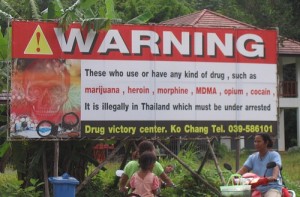 Thailand is known to be strict when it comes to drug related cases. The problem of drug trafficking in Thailand has been addressed by the Thai Government through imposition of a harsh penalty such as life imprisonment and even death. Historically, laws that govern illegal or prohibited drugs have been enacted since 1360. As Thailand grows and develop, its laws toward drug related activities have also been amended to conform to the existing conditions of the country. Primarily, drug cases in Thailand are governed by the Narcotics Act, the Psychotropic Substance Act, and the Drugs Act. Note that when found guilty you can obtain extradition to your home country by the government. It is however very difficult for drugs crimes and those who do get sent home are normally those involving in fraud and violent crimes.
Thailand is known to be strict when it comes to drug related cases. The problem of drug trafficking in Thailand has been addressed by the Thai Government through imposition of a harsh penalty such as life imprisonment and even death. Historically, laws that govern illegal or prohibited drugs have been enacted since 1360. As Thailand grows and develop, its laws toward drug related activities have also been amended to conform to the existing conditions of the country. Primarily, drug cases in Thailand are governed by the Narcotics Act, the Psychotropic Substance Act, and the Drugs Act. Note that when found guilty you can obtain extradition to your home country by the government. It is however very difficult for drugs crimes and those who do get sent home are normally those involving in fraud and violent crimes.
Narcotics have been described by Narcotics Act to include any form of chemicals or substances which upon being consumed may cause physiological or mental effect. Dangerous drugs on the other hand are modern form of traditional drugs which are considered as dangerous by the Minister of the Government Gazette. Speak to a lawyer with regards to Section 72 of the Drugs Act, a person is prohibited to produce, sell, or import the following drugs:
-
Fake Drugs: any drug/substance which is considered as an imitation of a genuine drug, partly or wholly; or any drug which shows name of another drug, or one that bears an expiration date which is not correct; or any drug bearing a false description of the producer and its location; or any drug which falsely show that the contents are in accordance with the formula for which it was registered; or drugs which are produced with active substances which quantity or strength is lower by 20% than the minimum or higher by 20% than the maximum standards set by the registered formula;
-
Substandard Drugs: any drug produced with active substances which quantity or strength are lower than the minimum standards prescribed in the registered formula; or any drug produced so that their purity or other characteristics which are important to their quality differ from the standards prescribed in the registered formula;
-
Deteriorated Drugs: an expired drug; a drug which has so denatured as to have the characteristics of a fake drug or a drug which differs from the minimum standards set by the registered formula;
-
Drugs that have not been registered;
-
Drugs produced and imported by a licensee which registration formula has been cancelled;
-
Drugs which formula registration has been ordered cancelled by the Minister.
Under the Thai laws, any person licensed to produce or import drugs is required first to apply or register the drug to be produced or imported. Under the Narcotics Act of Thailand, narcotics are classified into five categories such as:
Category I: Dangerous narcotics such as heroine;
Category II: Ordinary narcotics such as morphine, cocaine, codeine, medicinal opium;
Category III: Narcotics which are in form of medicinal formula and contain narcotics of Category II as ingredients in accordance with rules prescribed by Minister and published in the Government Gazette
Category IV: Narcotics which consist of chemical used for producing narcotics of Category I or II such as acetic anhydride, or acetyl chloride;
Category V: Narcotics which are not included in Category I-IV such as marijuana or Kraton Plant.
Any one caught in violation of the above mentioned laws shall be punished by imprisonment or death depending on the circumstances as weighed by the Thai Courts.
GUIDANCE FOR TRAVELLERS UNDER TREATMENT CARRYING PERSONAL MEDICATIONS CONTAINING NARCOTIC DRUGS AND PSYCHOTROPIC SUBSTANCE INTO/OUT OF THAILAND:
The Food and Drug Administration of Thailand lays down the guidelines to be followed by the travelers in and out the country in cases where they will carry with them medications which contain prohibited narcotics or substances.
-
The traveler is allowed to carry for his personal treatment medications which contain substance classified in Category II, III, IV provided however that the quantity of which shall not exceed 30 days of usage. The traveler is required to obtain a permit “Form IC-2” issued by the Food and Drug Administration. He is also required to submit the following:
-
Application Form
-
Medical Prescription issued by a Doctor identifying the medical condition of the patient as well as the necessity of the medical treatment, the total amount of the dosage and the name, address, license number of the doctor;
-
Certificate issued by the competent authority that the patient has authority to carry the medication;
-
The traveler is required to declare the medication he is carrying into or out of Thailand. he is also required to present the document or medical certificate upon entry to the Red Channel and upon exit to the Custom VAT Refund;
-
The medical certificate should be kept by the traveler all through his stay in the country;
-
The Medication is required to be kept in the original prescription bottle with the contents clearly marked
-
The traveler is not allowed to sell nor supply medications to another.
The guidelines laid by the authorities of Thailand are changing hence, it is necessary to abreast oneself of the new guidelines as well as laws of Thailand. It is necessary therefore to consult a Thai immigration lawyer or Thai criminal lawyer to avoid possible penalties and conflicts with the Thai government.



